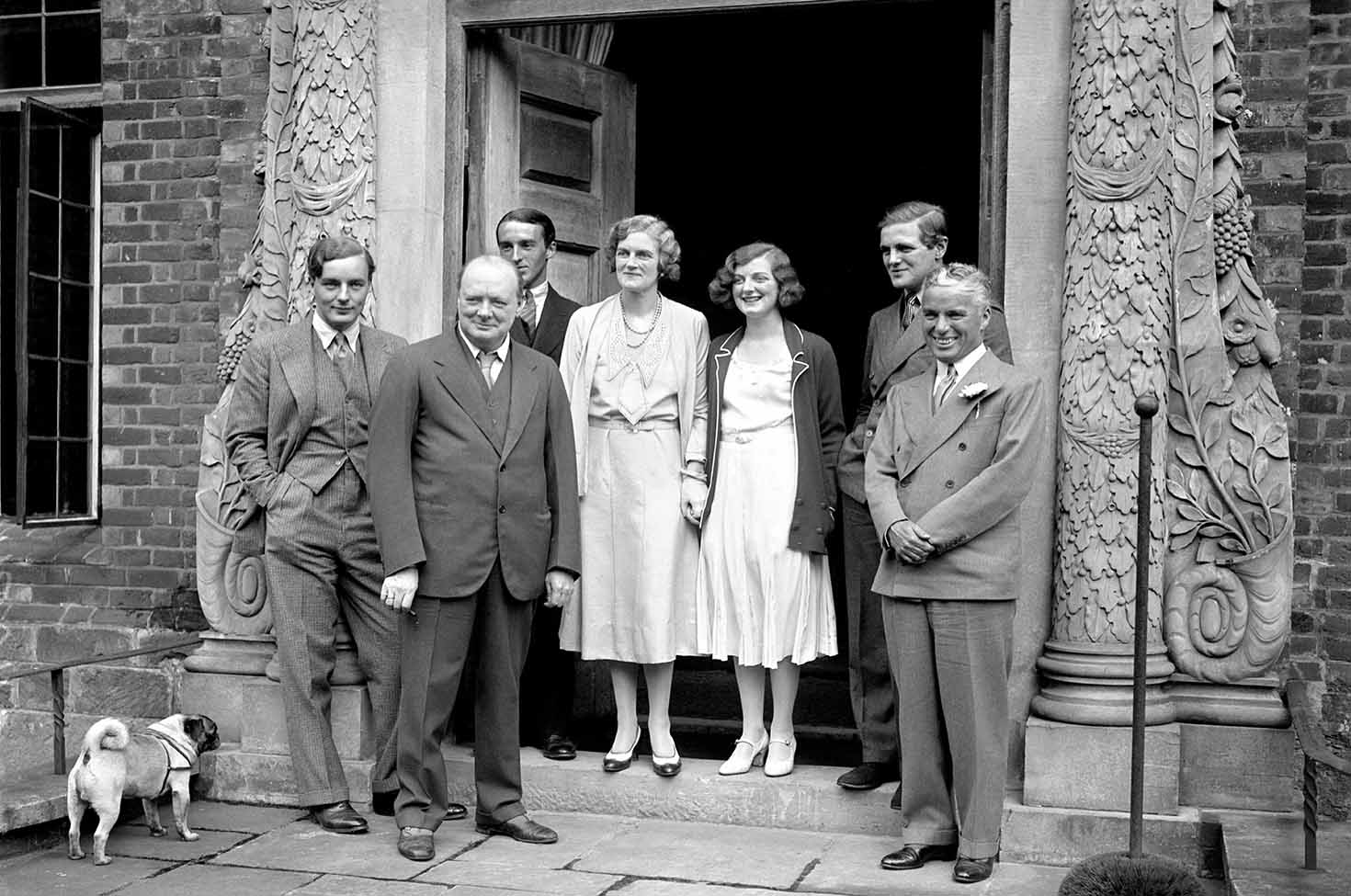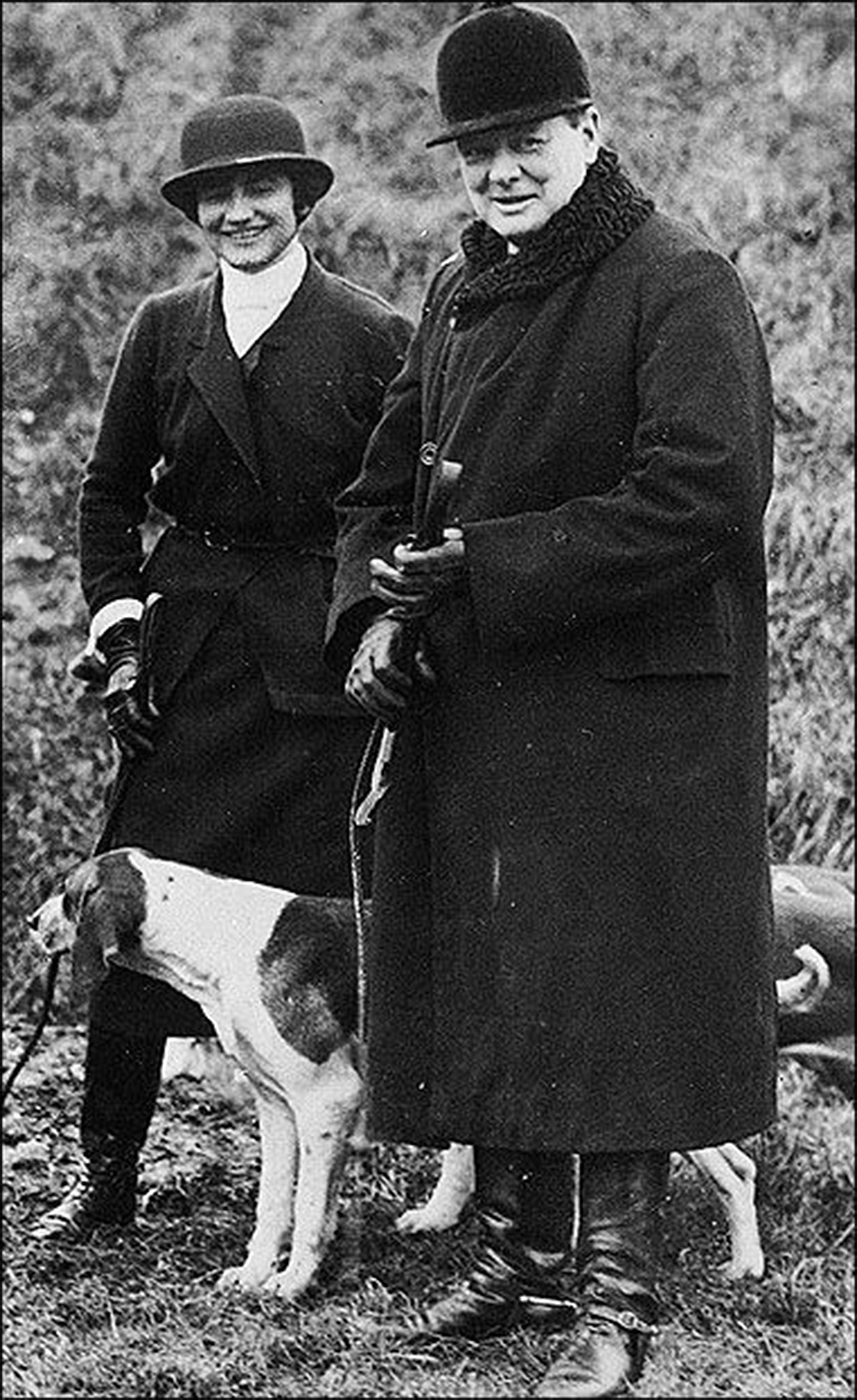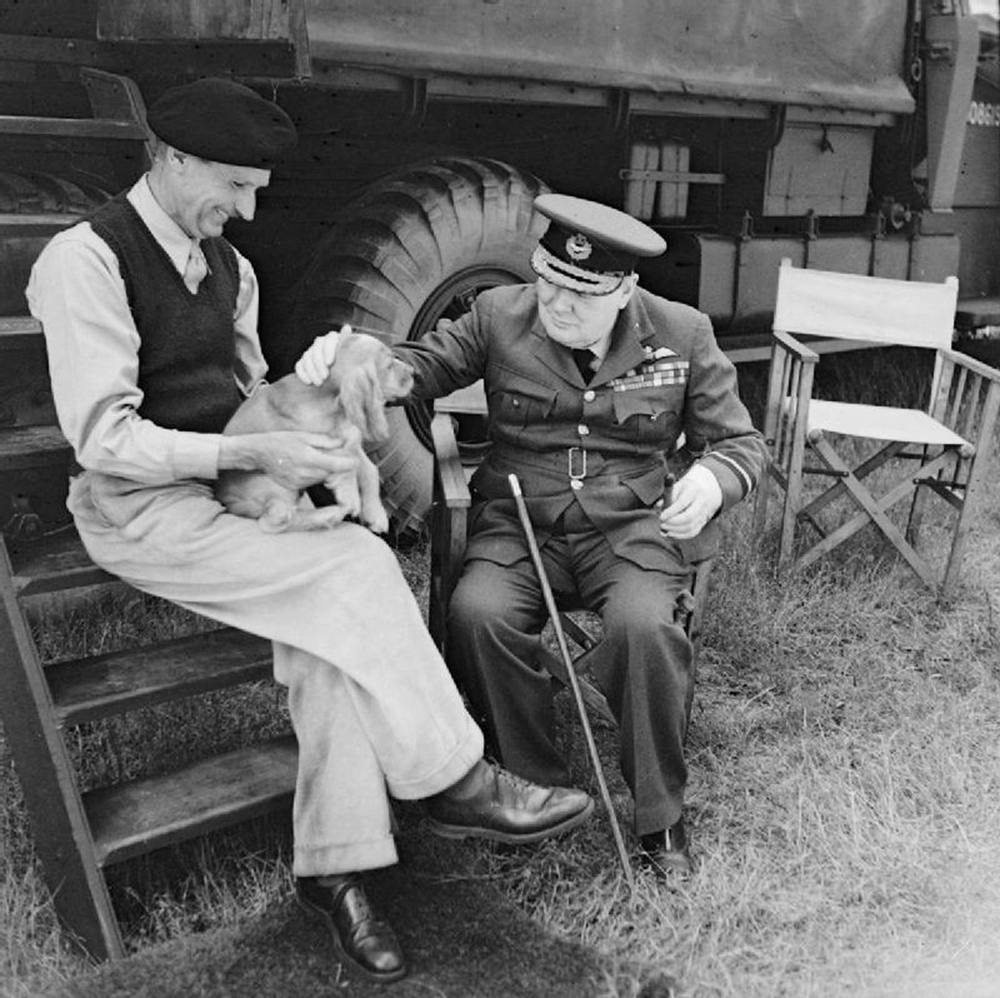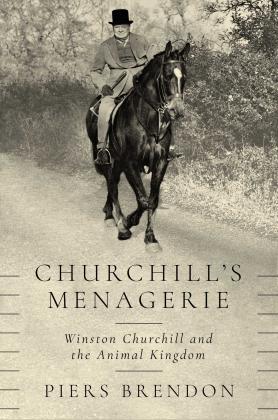
Winston Churchill meets Charlie Chaplin, 1931. Flickr.
Winston Churchill had his first recorded encounter with a poodle at the age of eight, when his mother took him to a pantomime at the Aquarium Theatre in Westminster. As she reported to her husband, “there was a large poodle, who was brought on the stage and introduced as ‘Ld R. Churchill.’ Winston said ‘& it ran & barked & squeaked at everyone.’ ”
Poodles by this time often performed in fairs, circuses, and music halls, though they had originally been bred on the Continent as gundogs, their coats clipped so that they could retrieve game more easily in marshland, with pompoms and bracelets being left over the joints to guard against rheumatism. Their increasingly elaborate, often comical, coiffure made them attractive to the Victorian beau monde. Miniature poodles (smaller than the standard size and sometimes used to hunt for truffles) became especially fashionable as lapdogs. But Churchill himself did not acquire one until late in life, when it became the most adored of all his pets. “No one should not know the companionship of a dog,” he said with double-negative emphasis. “There is nothing like it.”
Apparently the delay was caused by his conviction that dogs never liked him very much. However the chocolate-brown miniature poodle that was his frequent companion throughout World War II, named Rufus (presumably after the first of that color to be bred, in 1891), seems to have returned his affection. Admittedly there were occasional tiffs. Once, as Lord Kilmuir later recalled, Rufus was alarmed by an outburst of Churchillian bad temper and responded with a frenzy of wails and woofs. “Take that dog away,” his master roared. “We cannot both be barking at once.” But Rufus sometimes slept on the prime minister’s bed. He often sat on Churchill’s lap, accompanying him on car journeys and being given pride of place at Chartwell, Chequers, and 10 Downing Street. He even ventured into the Cabinet Room during a meeting. “No, Rufus,” said Churchill. “I haven’t found it necessary to ask you to join the wartime Cabinet.”

In October 1947 Rufus was run over and killed. Churchill was at the Tory Party Conference in Brighton and the news was kept from him until it was over. When told he was devastated, so much so that he could not forgive the maid who had let the dog off the leash and never spoke to her again. He sought a substitute, which was provided by Walter Graebner, the American journalist who arranged the serialization of Churchill’s war memoirs in Life magazine. Graebner found a lookalike poodle of championship class at the Duke Street Kennels, which had supplied Rufus in the first place. Churchill was not immediately hooked, telling Graebner, “I’d like to try living together before coming to a permanent arrangement.”
His caution seemed justified when the new poodle developed distemper and later suffered from “a slight case of chorea…‘twitching’ in his leg.” Churchill therefore decreed that “the marriage can’t take place.” In January 1948 he told Bella Lobban, who ran the Duke Street Kennels, that after his sad loss he did not wish to own another dog at the moment. She persisted, saying that the poodle would surely recover and that he was so lovable and elegant that she would like to keep him herself. But Churchill was insistent: “I do not want to have the poor little dog.” However, as Graebner observed, the attachment grew and at some point Churchill took to introducing the poodle thus: “His name is Rufus II—but the II is silent.”
Churchill’s vet, Leslie Pugh, knew all too well how susceptible he was to animal magic. So when Pugh’s partner, J.W. Bruford, examined Rufus II in March 1948, he gave Churchill his “firm opinion that you should not allow yourself to become attached to this dog, as it is likely that he will be an unsatisfactory companion within a year or so.” His view was based on the fact that Rufus II was highly strung and affected with chorea. “He has also a bad set of teeth owing to a severe illness when he was puppy, and he will probably suffer from very objectionable breath for the rest of his life.” Meanwhile Churchill seems to have kept Rufus on trial. In May, at any rate, he gave a local man £10 as a reward for finding the poodle, who had escaped from Chartwell and spent a night in the rain—the man’s wife replied “respectfully” and touchingly that “we were very glad to do a small thing for one who has done so much for us all.”
On June 3 the vet wrote a second and still more damning report on Rufus II. In addition to his other defects, it was “probable that this will be an unthrifty dog, subject to attacks of gastritis and possibly rheumatism.” Furthermore, when in “a sitting position his penis is constantly exposed, and in consequence there is a constant discharge from the sheath.” Obviously disappointed, Churchill told Miss Lobban that in view of the vet’s verdict he would not retain Rufus despite his “many good qualities.”
During the course of the month, however, Churchill again changed his mind. Never one to be impressed let alone intimidated by experts, he succumbed to Rufus II’s charm and allowed his heart to rule his head. “I have at last found a miniature poodle who is both attractive and companionable,” he wrote, “and whom I intend to keep.”
In some respects the vet’s assessment proved correct. Rufus’ health was erratic, his jaw was troublesome, and by 1956 he had lost all his teeth. Although the worst of his chorea cleared up, he remained subject to muscular spasms. Despite meticulous shaving and grooming, he got fleas and other pests which made him scratch. His halitosis was appalling: Anthony Montague Browne said that he had “breath like a flamethrower.” Rufus never became fully house-trained. Belying his ancestry as a waterdog, he disappointed Churchill by his reluctance to swim—the poodle had to be pushed into the swimming pool at Chartwell, with his master’s valet, Norman McGowan, acting as lifeguard. Rufus was highly temperamental and inclined to mope, especially when Churchill was too busy to do much more than bid him “Good morning.” In 1958 Clementine Churchill told Lord Moran, “Rufus has been a great failure.”
Churchill himself would have entirely disagreed. He established a swift, enduring, and passionate relationship with Rufus, who also captivated his staff. Within two months of the poodle’s becoming a fixture in Churchill’s household one of his secretaries wrote to Miss Lobban, “Rufus is adorable and the greatest fun now. He was absolutely heartbroken when Mr. Churchill went away, but he is being well looked after and has settled down all right until his return.” Churchill’s absences were frequent and he expected they would cause Rufus to have a good howl. Absence certainly made Churchill’s heart grow fonder. He was quite capable of leaving a Commons debate to institute telephone inquiries about the poodle’s well-being, and he telegraphed from abroad to ask how Rufus was. Diana Cooper later recalled, “I have watched him mobilize tired notables at a house party to seek a lost poodle in twilight, and he once held up a meeting of urgency to wait for a vet’s verdict.” Churchill loved Rufus’ welcomes, and he was miffed on one occasion when, at a railway station, the dog greeted his valet first. “In future, Norman,” he instructed, “I would prefer you to stay in the train until I’ve said hullo.” Churchill was further hurt when Rufus showed a partiality to private secretary Grace Hamblin, telling her, “You’ve stolen my dog’s affection.”

Like his predecessor, Rufus often slept on Churchill’s bed, though he was removed when his licking of his master’s hands and face became too importunate. Rufus made himself at home in Downing Street, curling up on the knees of visitors. He was accorded special privileges in the Chartwell dining room, where he ate with the family, though his table manners were far from perfect—he once tried to maul the ornamental cat on top of Churchill’s birthday cake. Churchill persistently indulged him: “Poor darling, come and talk to me.” Rufus often sat in a special chair next to his master or on his lap, notably when watching film shows at Chequers. During the scene in David Lean’s Oliver Twist where Bill Sikes tries to throw the police off his track by killing his bull terrier, Churchill put his hand over Rufus’ eyes and said, “Don’t look now, dear. I’ll tell you about it afterwards.”
In January 1955 Rufus received a proposal from “Jennifer,” who described herself as “a standard poodle, first-class pedigree, very accomplished and a nice good-tempered character,” asking him to consider “giving me your kind services so that I can have some puppies by you.” The reply came by telegram: i am considering your proposal and will communicate with you shortly. rufus. Churchill consulted Miss Lobban, who said that mating pet dogs was likely to give them bad habits: “They think every dog they see is a bitch on heat, and run after them, and sometimes go off on their own to look for bitches. Also they sometimes run after people.” Once again Churchill ignored professional advice and his secretary reported that Miss Lobban would “very pleased to arrange Rufus’ marriage” and that only two or three hours would be required to complete the “ceremony.”
Rufus therefore wrote: “My dear Jennifer, On the 10th of April I shall be going to stay with a great friend of mine, Miss Lobban, who has very nice kennels in London. I should be very glad to receive you there; and Miss Lobban says she will make every arrangement for your comfort. This letter was marked very private. Churchill was not the first person or even the first prime minister to write in the name of his dog: the poet William Cowper sent a note as from his spaniel Beau and Lloyd George signed the visitors’ book at Danny House, West Sussex, with the paw mark of his Welsh terrier Cymro. Other pets too enjoyed a vicarious epistolary existence, especially those owned by writers: Walter Pater’s cat Pansie and her sister Atossa, who belonged to Edmund Gosse, went so far as to correspond in verse. Nevertheless the exchange of letters between Rufus and Jennifer was unusual, to say the least, and Churchill took care that their nuptial arrangements, made in 10 Downing Street, remained secret. Darling Rufie, as Churchill called him, died in August 1962. He was buried near the top terrace at Chartwell beside Rufus I, whose grave had been adorned with crocuses and blue tulips, their color chosen by their donor so as to leave Churchill in “no doubt as to how I voted in the last election.” In animals as in humans, Churchill was not inclined to grieve over death in old age, regarding it merely as part of the inevitable tragedy of our existence here below. But he was saddened by the loss of his “companion of many years,” whose intimacy had assuaged not only the cares of senescence but the loneliness of leadership. “He was my closest confidant,” Churchill said. “Rufus heard everything.”
From Churchill’s Menagerie: Winston Churchill and the Animal Kingdom by Piers Brendon, published by Pegasus Books on June 4, 2019. Copyright © 2019 by Piers Brendon. All rights reserved.
